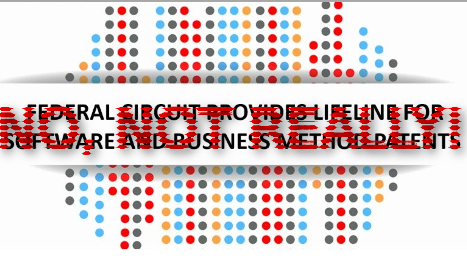

Now, the Federal Circuit has denied both petitions with opinions by Judges Moore, Lourie, and Reyna. The exact vote was not released, but at least 7 judges voted to deny.
[...]
Clearly Judge Reyna is correct in this aspect of his analysis even if I disagree with his ultimate conclusion that eligibility is purely a question of law.
I would look for Supreme Court petitions in both cases framed along the lines of: pro-patentee Federal Circuit judges seeking to undermine consistent Supreme Court precedent most recently restated in Alice and Mayo.
The U.S. Supreme Court’s Alice opinion on patent eligibility got a formal haircut Thursday.
The U.S. Court of Appeals for the Federal Circuit announced that it’s sticking with two February decisions that limit the kinds of patent cases that can be decided early in litigation on a Section 101 motion.
Only one of the court’s 12 active judges dissented from the denial of en banc review in Berkheimer v. HP and Aatrix Software v. Green Shades Software, though two others also called on Congress or the Supreme Court to intervene.
As part of the court’s en banc denial in Berkheimer v. Hp Inc., 2018 U.S. App. LEXIS 14388 (Fed. Cir. 2018), Judges Lourie and Newman joined together in an interesting concurring opinion that argues for some higher power to revisit the doctrine of patent eligibility to provide clarification and policy guidance.
[...]
For a federal appellate court, there are typically two such “higher authority” mechanisms for altering the law: (1) Supreme Court reinterpretations and (2) changes in the law itself. In the opinion, Judge Lourie rules out a reinterpretation by the Supreme Court as insufficient — thus leaving us with changing of the law.
The full Federal Circuit voted Thursday not to rehear two cases seen as making it harder to invalidate patents for claiming ineligible material under the U.S. Supreme Court’s Alice test, saying the holdings that patent eligibility can involve factual issues follow established litigation rules.
The court, with only one judge dissenting, denied petitions for en banc rehearing by HP Inc. and Green Shades Software Inc. in two separate cases that shook up patent law when they were decided within days of each other in February.
Over on the main page, Dennis has pointed out that a cert petition including citations to my posts here about why Section 101 is not a “defense” to infringement, and to the recent CAFC cases about why 101 includes factual inquiries. This rant is about those issues.
[...]
Where the judicial activism of the Supreme Court has put our country is is in a dire place. We are in a time when innovation is king. China has more patents pending than the U.S. Around the country, I have heard executives from all types of industry state that our system has made patenting of dubious value. The data shows that the Supreme Court’s rampant activist approach — undertaken perhaps in a noble effort to get rid of some (too many) stupid patents (and combined with IPRs) — has made our patent system weak, eliminated key incentives to innovate, and, most fundamentally, ignored the changes Congress made back in 1946 to stop this nonsense.